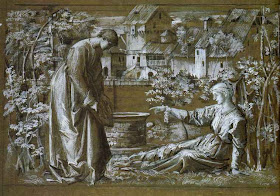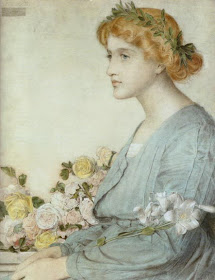
signed with monogram and dated 1879 l.l.
pencil and chalk
37½ by 22 in
Hammer Price with Buyer's Premium: 121,250 GBP (2008)
Henry Treffry Dunn recalled how Rossetti had first seen Miss Wilding in 1865 (whose first name was in fact Alice, although in due course she adopted the more exotic 'Alexa') when she was walking in the Strand and how he had besought her to allow him to paint and draw her. On the first occasion of asking she failed to appear at his studio as had been arranged, but, according to Dunn's account, by chance Rossetti saw her again - apparently at the same spot where he had seen her before. On this second occasion, Rossetti succeeded in persuading Alexa that his intentions were honourable, so that in due course she began to serve as a model. One of the first studies of Alexa, dated 1865, was sold in these rooms (12 July 2007, lot 14). Within a year, Rossetti had embarked on the series of paintings of her, of which Venus Verticordia (Russell-Cotes Art Gallery, Bournemouth) Monna Vanna (Tate, London), Sibylla Palmifera (Lady Lever Art Gallery, Port Sunlight) and La Ghirlandata (Guildhall Art Gallery, City of London) are among the most famous. During the second half of the 1860s and early 1870s, Rossetti relied upon Alexa Wilding to be available to him, finding her a patient and biddable sitter, and with a kind of beauty which was passive enough to allow her to adopt a wide variety of personifications and roles. Over a period of several years he paid her a small salary that she should model for him exclusively, perhaps because it was known that other artists - notably John Everett Millais - desired to paint her.
Alexa Wilding's personality is hard to gauge, either from the accounts of people who knew her, or on the basis of her representation in Rossetti's paintings and drawings. Dunn described her as a woman whose 'lovely face [was] beautifully moulded in every feature, [and] full of a quiescent soft mystical repose that suited some of his [Rossetti's] compositions admirably, but without any variety of expression'. William Michael Rossetti, Dante Gabriel's brother, found her physiognomy more demonstrative, describing 'a head of fine and rather peculiar mould, eminently strong in contour and also capable of much varying expression'. Frederic George Stephens believed that 'in regard to her form and air, he [Rossetti] never adopted a more exquisite form of womanhood, per se' than 'the beautiful Miss Wilding', explaining that Rossetti's representations of Alexa were quite personal and dependent upon his own feelings for her: 'So many differently inspired versions did Rossetti give us of the beauty of Alice Wilding. Nevertheless, I dare say, not a little of her charm existed mostly in the passionate heart of the painter; yet I well remember that nothing he drew of her, diverse as the delineations were, seemed less than an exact likeness'.
Alexa made occasional visits to Kelmscott Manor in Oxfordshire, where Rossetti lived for a period from 1872, although she was only permitted to go there when Jane Morris was not in residence. In 1873 she attempted to gain her financial independence by setting up a boarding house, although in the mid-1870s she still received money from Rossetti. Gradually, however, she drifted out of his circle, and by the late 1870s was modelling for him only on rare occasions. Two children were born to her, in 1876 and 1877, although Alexa seems not to have been married to their father. The present drawing is among the last appearances of Alexa in Rossetti's art. The second version of Rossetti's Sancta Lilias of 1879 (Virginia Museum of Fine Arts) was his last painting for which she served as a model. H.T. Dunn described how Alexa, after Rossetti's death in 1882, made an expedition to the churchyard at Birchington-on-Sea to lay a wreath upon his grave. She herself died in 1884, aged thirty-seven.
Biographical information about Alexa Wilding, and a detailed account of her relationship with Rossetti, is given as Appendix 3, 'Monna Innominata: Alexa Wilding', in William E. Fredeman (ed.), The Correspondence of Dante Gabriel Rossetti, vol. VI, Cambridge, 2006, pp.605-45. See also, Simon Toll, 'Dante Gabriel Rossetti's discovery of Alexa Wilding', British Art Journal, vol. VII, no. 2, pp. 87-91.
Rossetti's 1879 drawing shows Alexa Wilding, her arms resting on her crossed knees, her left hand resting on her right, and her right foot appearing from beneath flowing draperies. The girl's face and head are carefully drawn and characteristic of Rossetti's work in the last phase of his career. The remaining part is more summarily treated, with sweeping lines and rapidly applied hatching making up the outlines of her body. The discrepancy in the degree of care given to these different areas of the drawing, with a corresponding variation of quality, may be the result of Rossetti's having commenced the study as a portrait of Alexa on a more restricted format and representing only her head and shoulders, but having as an afterthought decided to treat her as a full length seated figure. As is often the case with Rossetti's later drawings, the original sheet – which offered sufficient space for a head and shoulders study – has been added to at its lower edge to double the composition's overall size.
When the present drawing belonged to the London firm of art dealers Barbizon House (probably in the 1920s), it was given the title Desdemona, suggesting that it was made as a study for the projected but never completed composition based on Shakespeare's play Othello (Act IV, Scene III), upon which Rossetti was working in the late 1870s and until shortly before his death. The pose taken is, however, very different from that shown in the two other drawings of the figure of Desdemona (the first, Birmingham City Art Gallery; Surtees 254D, plate 381; the second, Lord Lloyd-Webber collection). The stance of the figure in the present drawing seems more likely to be connected with the later version of the drawing Michael Scott's Wooing (William Morris Gallery, Walthamstow; Surtees 222, plate 313), in which the figure who is the object of the loving attention of Michael Scott similarly sits with her hands crossed and resting on her knees. Michael Scott's Wooing was a project to which Rossetti returned intermittently, from 1867, when the first watercolour version was commissioned, to 1871, when Frederick Leyland asked for an oil version of the subject. Two further drawings, one of a girl alone, the other of a girl with a boy who kneels before her (Victoria and Albert Museum; Surtees 222C, plate 314, and Birmingham City Museum and Art Gallery; Surtees 222B, plate 316, respectively) seemed to have been made in connection with it (one is dated 1869), and both of these show the girl facing towards the right, as we see her in the present drawing. In the Walthamstow drawing the girl's head is lowered, as it is to a lesser degree in the present drawing. However, the connection between the Walthamstow version of Michael Scott's Wooing and the present drawing is complicated by their being opposite ways round – with the model in the present drawing facing towards the right, while she faces towards the left in the Walthamstow drawing. Furthermore, although the Walthamstow drawing is not securely dated, it may be assumed to come from an earlier period than 1879.
The present drawing should perhaps be regarded as simply an extempore sketch of Alexa Wilding, rather than a compositional design related to a realised or intended project. Certainly it captures the soulful and dolorous beauty of a woman who Rossetti admired intensely. In making the drawing, he may have been unconsciously essaying an earlier figure type but without any deliberate intention of making a design which might easily be transferred into a figural composition.
CSN (Sotherby's)
http://www.sothebys.com/app/live/lot/LotDetail.jsp?lot_id=159509088









.jpg)







































